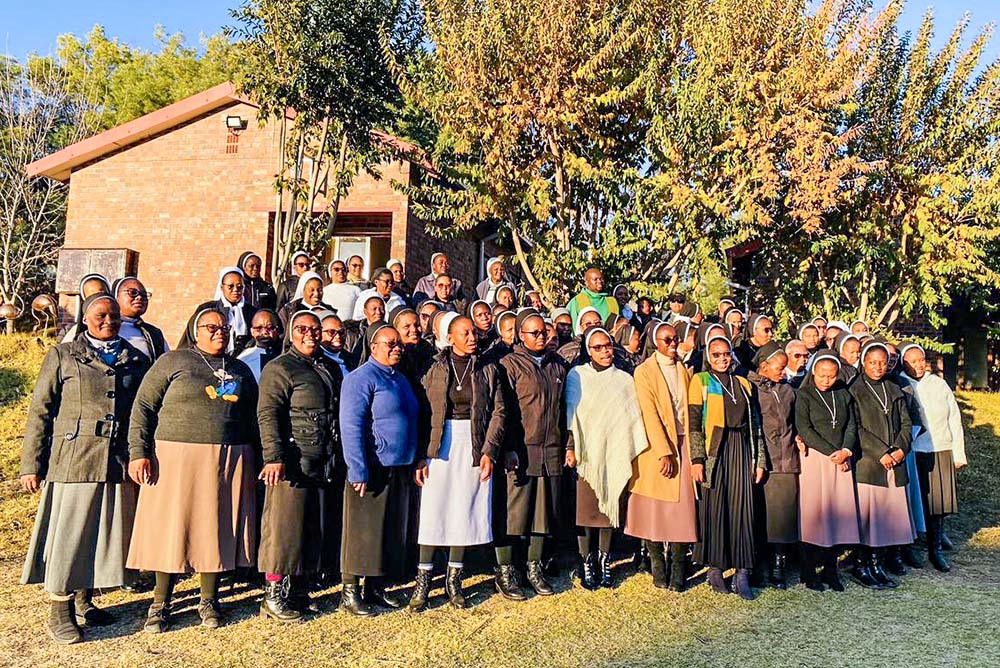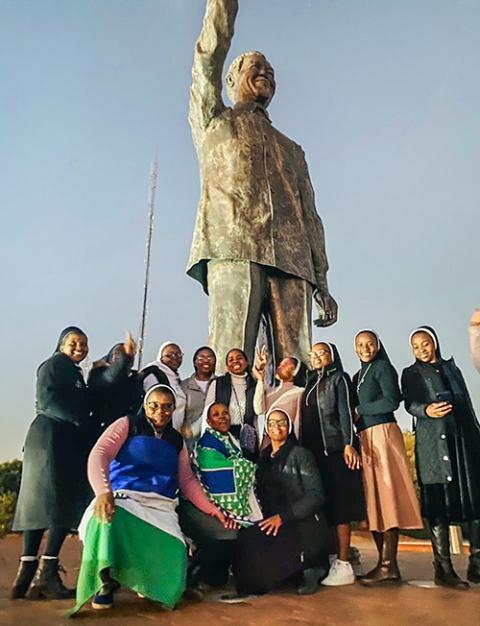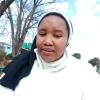
Sisters participating in the Winter School pose for a photo with Fr. Thabo Edward Kenke on June 14 at Regina Pacis Retreat Centre in Free State, South Africa. (Alphoncina Motlhasedi)
When we are truly called to lay down our lives for others (1 John 3:11-24), God invites us to live with perception, to distinguish when to be well-founded and when to hit the road. God asks us to live in the mysterious faith and to live in the uncertain with hope, believing in the revelation of a deeper knowing and certainty that blossoms as love. God asks us to surrender our inner personal experiences and terrors, our preconceptions and plans, ultimately falling into self-emptying love, just like Jesus our master.
From June 9-16, the religious sisters from Lesotho and in Free State, South Africa, were brought together in Regina Pacis Retreat Centre, just outside Bloemfontein, South Africa, for "Winter School," an ongoing formation program.
Participants this year were the Sisters of the Holy Family of Bordeaux, Sisters of the Holy Cross, Sisters of the Holy Names of Jesus and Mary, Good Shepherd Sisters of Quebec, Sisters of Charity of Ottawa, Sisters of St. Joseph of St. Hyacinthe, and Franciscan Sisters of Siessen. The Sisters of Calvary from Botswana were also expected to be part of the program but could not make it because of various reasons. We anticipate and pray for a breakthrough so that they make it to the next year's Winter School, as this is an annual program.
Holy Names of Jesus and Mary Sr. Rosalie Trentacoste established the Winter School. In 1963, she said:
To be a missionary has been the only desire of my life and everything else has always been geared to this end. In a way, I will never fully understand my vocation as a Holy Names Sister or feel like a complete person unless it reaches fruition."
Inspired by these words, Sister Rosalie started the Winter School for the education of sisters of many religious communities in Lesotho. The school continues to this day and has even been extended to neighboring countries.
Advertisement
The event continues to teach religious sisters the importance of ongoing formation, providing them with opportunities to deepen their understanding of religious vocation. It improves a communal vision for mutual learning for strategic impact and growth, with some time off for leisure, and praying together for oneness in the church, as this is the sign of the church being Catholic.
With that spirit, the sisters carry on with their various charisms and put in action the spirit of synodality.
"Being gathered here is an opportunity for us to make new connections and to keep the already existing ones whilst they are deepened in the process. We also hope to strengthen the quality and viability of our shared energies. Let us strive to change our paths and be good leaders in our different ministries." Sr. Jacintha Rantso, the provincial of the Good Shepherd Sisters of Quebec, said on behalf of the major superiors of Lesotho and those of the Free State province in South Africa, as she officially declared the Winter School open.
Topics at Winter School included canon law and liturgy of the church facilitated by Fr. Thabo Edward Kenke, a diocesan priest in the Bloemfontein Archdiocese in Free State. He carried out his studies in philosophy at St. Augustine's Major Seminary (which now celebrates 100 years since its founding) in Roma, Lesotho, and in theology at St. John Vianney Seminary in Pretoria, South Africa. He concluded his studies at the Pontifical Urbaniana University in Rome, Italy, residing at Collegio Urbano. He holds degrees in both philosophy and theology from Pontifical Urbaniana University, along with a licentiate (master's) in moral theology, licentiate in canon law and second level master's degree in praxis and ecclesiastical jurisprudence.
Kenke spoke to sisters about the procedures for separation from the institute under the following subtopics: absence from the religious house, transfer to another institute, exclaustration, rights and duties (obligations) of the religious in exclaustration, the indult of departure, readmission of a member who lawfully left the institute, incardination ad experimentum, dismissal of religious, and admission of candidates and formation of members.
He concluded with the topic of the importance of sacred liturgy and how the liturgy of the church must be respected.

Sisters pose in front of a statue of Nelson Mandela at Naval Hill in Bloemfontein, South Africa, on June 15, during a tour that was part of the Winter School program. (Lipalesa Mothamane)
The topics and activities that took place reminded the sisters of who they are as religious women. They participate in acts of love and are able to do so because love itself has fashioned them. They love because love is the only applicable response to the crises that stir them and the challenges they experience.
The love in which the sisters participate is not a lenient and soft feeling that cushions them in their comfort. It is only by the grace of God that they are enabled to make tough decisions in the face of disparate realities and choices that can bring them forward in the evolutionary processes.
The fun activities shared during recreation, which included the celebration of the 200 years of the founding of the Basotho nation, made most if not all of the sisters happy, and definitely renewed their sense of belonging, which everyone needs in their vocation in order to stay content and peaceful.
Most of the sisters were challenged and even had the desire to study canon law. I trust this will help in the growth of the Catholic Church in Southern Africa. With the emphasis made by Pope Fransis when he said, "The contribution of women is more necessary than ever," while acknowledging the challenge of hatred, violence and ideological conflicts in today's world, Kenke made a plea that the sisters should consider studying courses like liturgy of the church, canon law, theology and other church-related material. Such studies will not only help their religious institutes but also the church at large.
With the Spirit inherited from the Winter School, together from various congregations, the "how" of development and the "why" of the Holy One provide us with the appearance of who we are and what we are about. As religious, we are creation aware of itself, and we are using our awareness to reflect, to discern and to make choices on behalf of others.
Rather than being a process that destroys human status, evolution allows us to preview a deep mystery, one that resonates all the way back to the ancient mystics who said that we are all one.
Therefore, the collaboration among us as religious brings us to our knees in appreciation and amazement, then drives us into action that is informed by the thankfulness and the faith that the fire of the Holy Spirit is alive in us.





